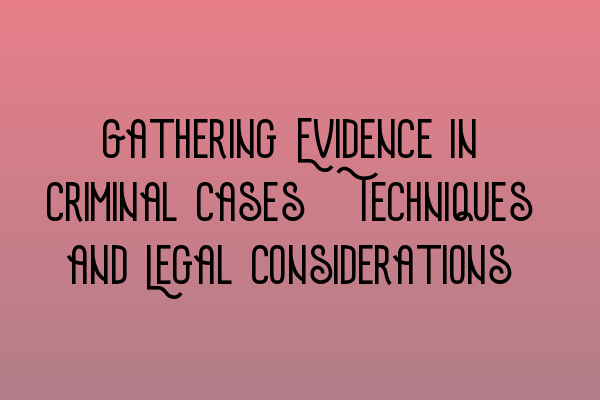Gathering Evidence in Criminal Cases: Techniques and Legal Considerations
Welcome to the SQE Criminal Law & Practice Law UK blog, where we provide valuable insights into various aspects of criminal law. In this article, we will discuss the essential techniques and legal considerations involved in gathering evidence in criminal cases. Effective evidence gathering is crucial for building a strong defense or prosecution case, and it requires a comprehensive understanding of the relevant legal principles and practical strategies.
Legal Framework for Evidence Gathering
Before diving into the techniques, it is important to first understand the legal framework for evidence gathering in criminal cases. The primary legislation governing this process is the Criminal Procedure and Investigations Act 1996. This act sets out the rules and procedures that must be followed by law enforcement agencies and legal practitioners when obtaining and disclosing evidence.
Furthermore, the SQE 1 Practice Exam Questions and SQE 1 Practice Mocks FLK1 FLK2 resources provided by SQE Criminal Law & Practice Law UK can help you better understand the specific legal concepts and principles related to evidence gathering. These practice materials will be invaluable in preparing for your SQE exams and gaining a deeper understanding of the topic.
Techniques for Gathering Evidence
1. Witness Statements: Witness statements play a crucial role in criminal cases. Interviewing witnesses and obtaining detailed and accurate statements can provide valuable evidence to support your case. It is important to ensure that witness statements are properly recorded and signed to comply with legal requirements.
2. Surveillance: Surveillance techniques, such as video recordings and monitoring, can be employed to gather evidence in criminal cases. However, it is essential to ensure that these techniques are conducted within the boundaries of the law and adhere to privacy laws and regulations.
3. Forensic Evidence: Forensic evidence, such as DNA analysis, fingerprinting, and ballistics, can be critical in linking suspects to the crime scene. Working with forensic experts and understanding the admissibility of different types of forensic evidence is key to successfully presenting it in court.
4. Digital Evidence: With the rapid advancement of technology, digital evidence has become increasingly important in criminal cases. Gathering and preserving digital evidence, such as emails, social media posts, and surveillance footage, requires specialized knowledge and expertise. It is essential to understand the legal requirements for obtaining and presenting digital evidence in court.
5. Expert Witnesses: Expert witnesses can provide specialized knowledge and opinions on complex scientific or technical matters. Engaging the right expert witnesses can significantly strengthen your case by providing expert testimony that supports your arguments.
For more detailed guidance on each of these techniques, SQE Criminal Law & Practice Law UK offers comprehensive SQE 2 Preparation Courses, which delve into the practical application of these strategies and provide hands-on training to enhance your evidence gathering skills.
Legal Considerations
When gathering evidence in criminal cases, it is crucial to consider certain legal principles:
- Hearsay: Evidence based on a statement made by someone who is not a witness can be classified as hearsay and may not be admissible in court, unless it falls within one of the exceptions outlined in the law.
- Privilege: Certain categories of evidence, such as legal professional privilege, may be protected from disclosure in court. Understanding the scope and limits of privilege is vital to avoid potential legal pitfalls.
- Chain of Custody: Properly documenting the chain of custody for physical evidence is essential to maintain its integrity and admissibility in court. Failure to establish an unbroken chain of custody can raise doubts about the reliability of the evidence.
- Legal Privileges: Identifying legal privileges, such as the right against self-incrimination or spousal privilege, is crucial when dealing with witnesses or defendants. Failing to respect these privileges can lead to serious legal consequences.
To stay updated on the latest SQE criminal law exam dates and other important announcements, make sure to regularly check the SRA SQE Exam Dates webpage.
In conclusion, gathering evidence in criminal cases requires a thorough understanding of the legal framework, effective techniques, and legal considerations. By utilizing the resources and training materials provided by SQE Criminal Law & Practice Law UK, such as the SQE 1 Preparation Courses, you can enhance your knowledge and skills in evidence gathering, increasing your chances of success in your criminal law career.
We hope you found this article informative and valuable. Stay tuned for more insights into various aspects of criminal law from SQE Criminal Law & Practice Law UK!
